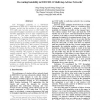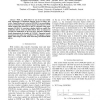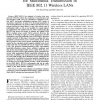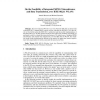AHSWN
2006
14 years 26 days ago
2006
TCP throughput instability is a well-known phenomenon in IEEE 802.11 multi-hop ad-hoc networks. However, we find that this problem is not restricted to TCP traffic only, but also ...
CN
2008
14 years 27 days ago
2008
In high density (HD) IEEE 802.11 WLAN, packet loss can occur due to co-channel interference (asynchronous interference) or collisions (synchronous interference). In order to effec...
GLOBECOM
2008
IEEE
14 years 29 days ago
2008
IEEE
WiFi, i.e., IEEE 802.11 is one of the most widely used technologies to implement internet access in today's networks. Typical frame error rates in IEEE 802.11 are much higher ...
CONEXT
2009
ACM
14 years 1 months ago
2009
ACM
Recent analytical and experimental work demonstrate that IEEE 802.11-based wireless mesh networks are prone to turbulence. Manifestations of such turbulence take the form of large...
PDCN
2004
14 years 2 months ago
2004
IEEE 802.11, the standard of wireless local area networks (WLANs), allows the coexistence of asynchronous and time-bounded traffic using the distributed coordination function (DCF)...
NETWORKING
2004
14 years 2 months ago
2004
In this paper, we study how fairness affects the performance of TCP over ad hoc networks with IEEE 802.11 at the MAC layer. The problem addressed is that the throughput of TCP flow...
NETWORKING
2004
14 years 2 months ago
2004
The most widespread Wireless Local Area Networks (WLANs) are based today on the IEEE 802.11 standard and its various versions, especially the IEEE 802.11b. In this article we first...
CIIT
2004
14 years 2 months ago
2004
Due to the fact that high datarate has shorter transmission range, the benefit of using high datarate may be degraded for IEEE 802.11 based multihop ad hoc networks. In this paper...
ISSA
2008
14 years 2 months ago
2008
Many people who have tried to configure their IEEE 802.11 enabled mobile phones to connect to a public wireless hotspot know one of the major differences between IEEE 802.11 netwo...
IFIP
2000
Springer
14 years 4 months ago
2000
Springer
: IEEE 802.11 is a wireless network standard that was completed in 1997. Unfortunately, the medium access protocol described in the standard meets some problems that arise from the...





